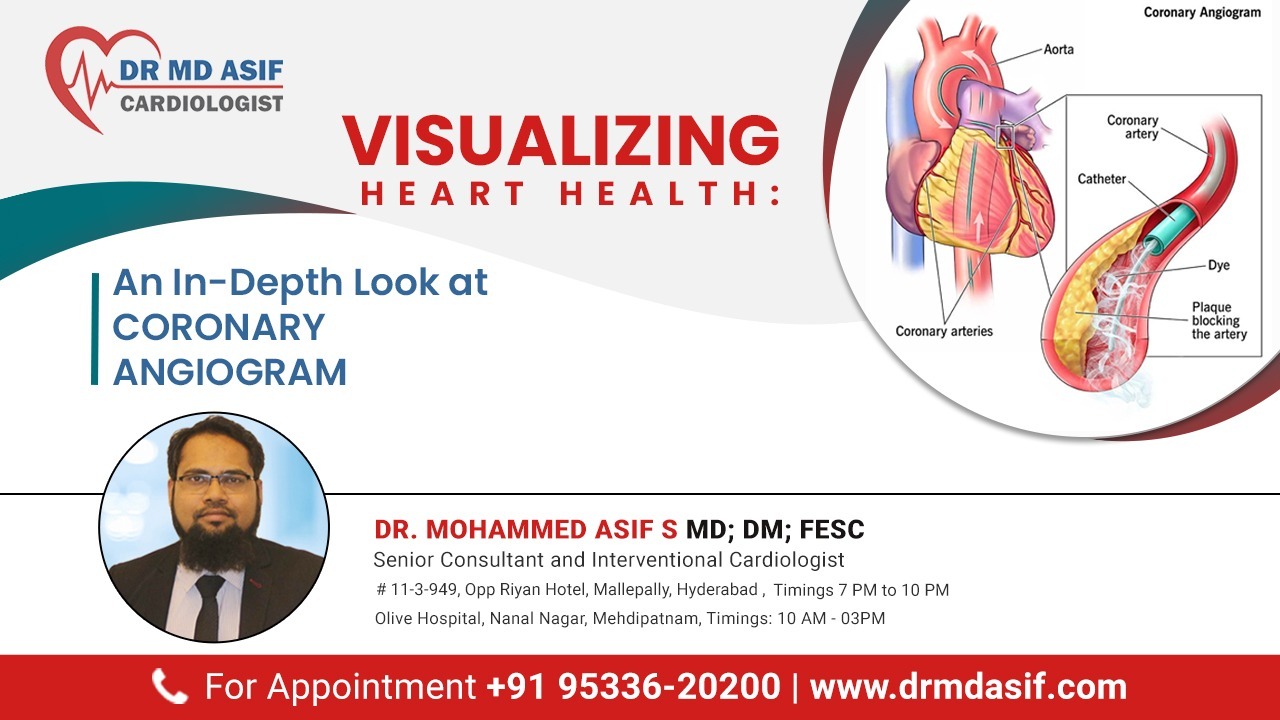Call us for any question
9533620200, 8179002888Meds Super Speciality Hospital
MallepallyTimings: 7 pm to 10 pm
mohammed4248asif@gmail.com

Blog s
Visualizing Heart Health: An In-Depth Look at Coronary Angiogram

Updated at: 16 Jun 2023
Introduction
Heart health is critical for a healthy life. But various tests are used to monitor how your heart works. Sometimes it cannot be very clear which test should to prefer to get the exact result. Suppose you have ever been recommended to have a coronary angiogram. In that case, you are likely curious about what it entails and why it is such an important procedure when assessing the health of ones heart. This technique helps cardiologists to see the blockages in the coronary arteries. In this blog post, we will discuss a coronary angiogram and how imaging technology has increased our understanding of heart disease so patients can lead healthier lives.
Also read: Potential of Angioplasty
What is a coronary angiogram?
A coronary angiogram can check the state of your hearts arteries. This procedure uses an X-ray test that checks for blockages and monitors blood flow. The coronary arteries are responsible for delivering blood to your hearts muscles, and when they are blocked, they can cause heart attacks that damage cardiac muscle tissue. Your healthcare provider may recommend a coronary angiogram to determine whether you need medicine, angioplasty, stenting or coronary artery bypass surgery.
Is a Coronary Angiogram necessary for you? Find out now.
A coronary angiogram might be necessary in several cases.
Abnormal stress test or EKG results.
Heart attack, valve problems, or heart failure diagnosis.
Upcoming heart surgery with potential for coronary artery disease.
Recent or changing chest pain (angina).
Unusual chest discomfort or shortness of breath with no clear cause.
Coronary angiogram work procedure.
It is easier to find out blockages in your coronary arteries through a coronary angiogram. By inserting a catheter and injecting contrast dye into your arteries, your provider can visualize the blockages through X-ray imaging.
Typically narrowing arteries are caused by cholesterol plaque. This test allows early detection and necessary intervention. To prepare for the procedure, your provider will ask you to fast for eight hours and avoid certain medications at least one day before the procedure.
Get Prepared for Your Coronary Angiogram: What to Expect
It will take a half-hour to an hour-long for the coronary angiogram procedure. After the procedure, most people can go home on the same day. But spending the night in the hospital for recovery will be safe. Remember to wear the hospital gown provided for your test and use the restroom before the angiogram to avoid any discomfort. For safety concerns, please do not plan to drive yourself home on the day of the procedure. Arrange for transportation from the hospital after you have been discharged.
What is involved in a coronary angiogram?
During a coronary angiogram, you will lie on your back and receive medication to help you relax, while an electrocardiogram monitors your heart rhythm. Your cardiologist will access your artery through your groin or arm, using medicine to ease discomfort.
A tube will be placed in your artery, allowing your cardiologist to investigate your coronary arteries through the surface of your heart using wires and catheters. X-rays will help provide visual insight from all angles.
Once the catheter reaches your heart, dye will be injected into the tube to track its progress through your artery. This may cause a warm sensation. The dye will also highlight any blockages. So that healthcare provider may be able to clear with angioplasty and a stent procedure.
Your provider can determine if cholesterol is impeding blood flow, enabling you to get the right treatment to clear your arteries. Find out more about what to expect during a coronary angiogram today.
Post coronary angiogram - what to expect.
After your coronary angiogram, your healthcare provider will remove the catheter and apply a bandage to prevent bleeding. Depending on where the catheter was inserted, you may feel soreness and need to lie on your back for a few hours. While most patients are discharged the same day, complex procedures may require an overnight stay.
As anesthesia was used during the procedure, you will need someone to drive you home. Afterwards, you may experience fatigue, sensitivity, or bruising around the wound area for up to a week. Your doctor may advise you to limit your activities for a couple of days.
Are there any risks involved in getting a coronary angiogram?
While complications are unlikely with a skilled healthcare provider, those with age, diabetes, or kidney disease might be more susceptible.
Look out for these potential risks:
Low BP
Heart attack
Stroke
Blood clots
Irregular heartbeats
Kidney damage leading to dialysis
Pain or infection at the injection site
Reactions to anesthesia
Fluid buildup around the heart causes pressure
What results can you expect from a coronary angiogram?
If your healthcare provider tells you that your blood vessels are not blocked and your heart is getting enough blood, it is a normal result.
But if something is blocking your coronary artery or arteries, your provider can identify which and how severe the blockage is.
After the procedure, it is important to look for potential complications. Contact your healthcare provider if you experience excessive bleeding or swelling at the catheter insertion site. Also, if you are experiencing decreased circulation in your arms or legs, tell your doctor about each symptom.
Conclusion
Though a coronary angiogram may initially feel intimidating. But understanding the process can help your healthcare provider to make the right treatment plan. To ensure that you will get the best results, follow your healthcare providers instructions when preparing for the procedure. Additionally, take all medicines provided and recommended to maintain optimal heart health. Dr Asif performs the Angiogram test quite smoothly in Hyderabad. You can speak with him if you have questions about the coronary angiogram or anything related to heart health. Book an appointment with Dr Md Asif and clear all your doubts related to your heart.
Comments

Panel b in the fractured tibiae of Agc1 CreERT2; 2 best place to buy generic cialis online
Latest Post
-
⇨Heart Attack in the Gym: A Rising Concern
-
⇨Recognizing Early-Stage Blood Clot Symptoms in the Heart
-
⇨Obesity and Heart Disease: What is the Connection?
-
⇨Recognizing Early Signs of Prediabetes and Prevention Tips
-
⇨Impact of Chronic Rheumatic Heart Disease on Your Heart Health
-
⇨Connection Between Diabetes and Heart Disease: How It Affects Your Heart Health
-
⇨Why Regular Heart Check-ups Are Essential for Better Health
-
⇨10 ways to control high blood pressure without medication
-
⇨Know the Dos and Donts after heart bypass surgery
-
⇨Angioplasty vs CABG : All You Need to Know
-
⇨A Closer Look at Angiography Risks and Benefits
-
⇨What is the difference between angioplasty and angiogram?
-
⇨Connections Between Depression and Heart Disease: What You Need to Know
-
⇨Finding the Best Cardiologist in Hyderabad: Tips and Tricks
-
⇨How to Recognize the Signs of a Heart Attack or Heartburn
-
⇨Why Are Permanent Pacemakers Necessary, and what to expect during surgery?
-
⇨The Impact of Patent Ductus Arteriosus on Quality of Life| Dr Asif
-
⇨What Are the Causes, Risk Factors, and Treatments of Ventricular septal defect?
-
⇨Exploring the Pacemaker Surgery Cost in Hyderabad: What You Need to Know.
-
⇨Discovering the Different Types of ASD: What You Need to Know




Leave a reply